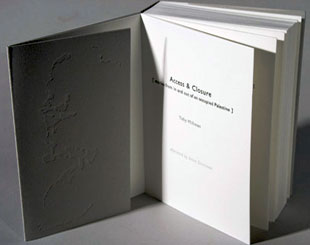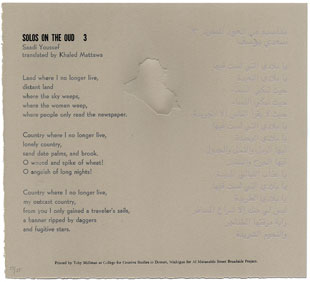|
|
Toby Millman ~
Michigan
|
|
|
|
| WSW: “Millman is a prolific artist book creator and is a master of intricate printmaking. Additionally, she is a photographer and occasionally a filmmaker.” |
| |
|
Family Business
By Toby Millman
Morgan Conservatory, Cleveland, Ohio : Toby Millman, 2019. Edition of 15.
4.25 x 5.5”; 72 pages. Letterpress and inkjet printing. Mounted and hinged print ephemera. Printed in two versions, on Mohawk Superfine Cover and Neenah Howard Linen, each with 13 ephemeral objects. Hard cover, drum-leaf bound. Bound in red book cloth with title stamped on front cover. Produced at the Morgan Conservatory in Cleveland, Ohio in July and August of 2019. Signed and numbered by the artist.
Toby Millman: "’Family Business’ … began from my father’s accumulated stash of business cards related to the now defunct import/export electronics company started by my grandfather, Irving Kryss, and his brother, Josef, in the early 1970s. The business once had offices in Miami, Chicago, Hong Kong, Taiwan, Tokyo, Colón and Caracas and the photographs and ephemera accumulated over the years tells a story of family, immigration and capitalism and the struggle to earn a living on one’s own terms.
“The production of 'Family Business' employed a range of tools and equipment spanning more than a century, and the included objects demonstrate various high- and low-end commercial printing techniques. As the 'family business' changed form, so did the methods of print production. The book tells a parallel story about the ubiquity of printed matter and how it reflects various points in time through the lens of this one company.”
Toby Millman: “The book is basically a family tree as represented through business cards. Immigration - as represented through all the different addresses on the cards - as well as some of the photos - is a theme that runs throughout and locations represented (through the business cards as some of the photos) include Miami, Chicago and Las Vegas (there are photos of their annual electronics show) as well as cities in South/Central America, Asia, Israel and Egypt. Other comments I’ve received relate to book of cards as a catalog of commercial printing technologies.”
$500 |
|
| |
|
| |
|
Access & Closure
[stories from in and out of an occupied Palestine]
afterword by Anton Shammas
By Toby Millman
Portland, Oregon: Oregon College of Art and Craft, 2008.
Edition of 50.
4.75 x 6.75 x 1.25; 64 pages. Letterpress printed from polymer plates set in Gill Sans Light on Stonehenge paper. Leporello bound. In an edition of 50 (45 bound, 5 boxed print portfolios) plus three artist proofs.
Toby Millman: "The stories in the book began during 2006, when I spent ten weeks in Palestine. During much of that time, I was living in a Melkite convent in the Sheikh Jarrah neighborhood of East Jerusalem, studying Arabic at Al Quds University and traveling to other areas of the West Bank. I recently returned from a longer visit, where I spent about two months in Tel Aviv and another five months in Ramallah. During this second visit, I continued my study of Arabic at Birzeit University while volunteering at a youth club at Jalazone refugee camp, writing for various cultural institutions and grassroots campaigns, and attempting to teach high school, all while collecting information to continue this body of work.
"I chose to title the book after the heading on this map as a way to summarize my experience as an American in Palestine. At its most obvious level, this work chronicles the access that I had as a foreign-passport holder traveling throughout the area. I was able to travel fairly easily compared to most Palestinians, and I was able to visit areas that are closed to many of those who call this land their home. But this work is more so about the access that the people I met allowed me into their lives. Without being welcomed into homes and guided throughout the streets, I never would have been able to create this work. On the other hand, I did not have full access to the land or its people. Aside from the Israeli-imposed closures that the map refers to, I was well aware - especially during my longer visit - that I am an outsider and certain aspects of Palestinian society are still closed to me. My book speaks to this closure in some ways. Whether it's in my naivety as I try to retrieve a stolen cell phone or my inability to communicate clearly in Arabic, there were many instances where I wished that I could be a Palestinian, an insider; to fully experience both the beauty and horrors of this place.
"All images were traced from original photographs or maps and the written vignettes are one hundred percent true (with a few names changed to protect the semi-innocent). The cover images have been drawn from maps produced by the UN Office for the Coordination of Humanitarian Affairs for the occupied Palestinian territories."
Anton Shammas, (part of his elegant) Afterword: "These snippets and vignettes of the quotidian, these minor and low-keyed interventions on the margins of the Palestinian page, in images and in words … interpret and translate the complex Palestinian reality."
$500 (6 bound copies + 1 unbound copy available) |

Click image for more
|
| |
|
|
| Toby Millman SOLD / Out of Print Titles: |
|
| |
|
Solos on the Oud (3)
By Saadi Youssef
Translated by Khaled Mattawa
Detroit, Michigan: College for Creative Studies, 2008. Edition of 25.
11 x 10" single sheet. Letterpress printed on Somerset Velvet. English printed from hand set type. Arabic printed with polymer plates. Blind embossed map of Iraq. Printed for Al Mutanabbi Street Broadside Project.
Toby Millman: "I chose to print this work by Saadi Youssef because I empathize with the theme of the poem, the longing for one's homeland. A few years ago, I spent five months as a volunteer in a Palestinian refugee camp and interviewed refugees who shared their memories of the towns and villages that they were expelled from in 1948. At Jalazone camp which is located north of Ramallah in the West Bank, exile, loss and a longing to return was within everyone's consciousness and, as in Youssef's poem, everyone there read the newspaper, perhaps searching for a hint in the current political atmosphere which may indicate that a return is near. However, as was the atmosphere in the camp, Youssef's poem is not optimistic.
"I printed the poem on grey paper to signify the dull lack of color that accompanies life as a refuge. Colors in one's homeland are always more vivid than in a refugee camp or an adopted country. The poem itself is also printed in a light grey, fading as memories from home become more distant. The poem's original Arabic is an even lighter grey, as the refugee's original language becomes further removed from the place where it was born. And lastly, the blind embossed map of Iraq is meant to speak to the absence of one's homeland, and allude to disappearance of a national culture that happens with events such as the looting of the Iraqi National Museum and the bombing of the historic book market on Al Mutanabbi Street."
(SOLD /Out of Print) |

Click image to enlarge
|
| |
|
Page last update: 09.05.2023
|
